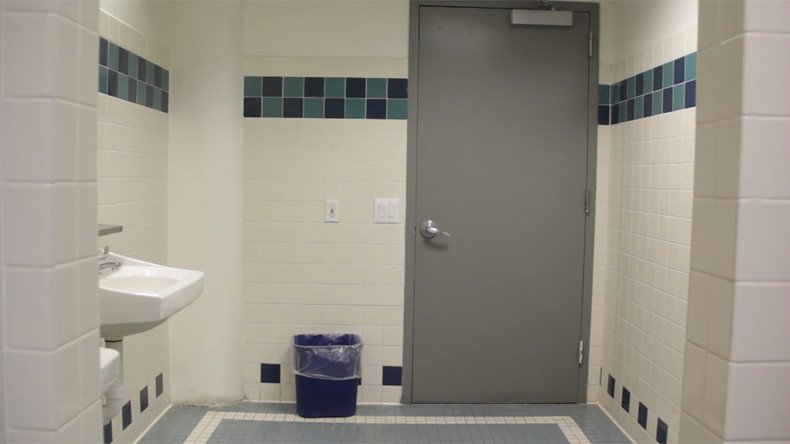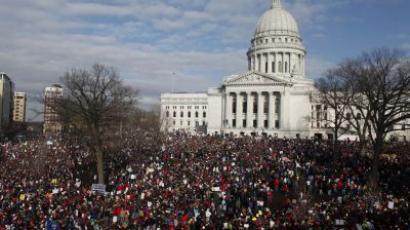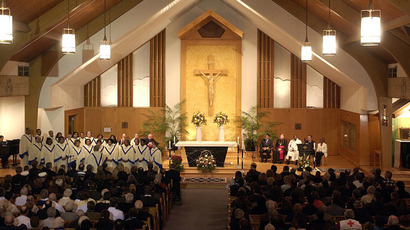Punch-out to pee: Company to pay $1.75mn for bathroom break back wages

A Pennsylvania company is racking up the back wages it has to pay current and former employees for forcing them to clock out in order to go to the bathroom. The business must present a plan to a judge for how to pay the $1.75 million it owes so far.
American Future Systems Inc., which does business as Progressive Business Publications, must present its proposal for how to manage the payment process to 6,000 current and former workers to US District Judge L. Felipe Restrepo by Thursday, the Philadelphia Inquirer reported. The plan is required by Restrepo’s mid-December ruling against the company for violations of the minimum wage and record keeping provisions of the Fair Labor Standards Act (FLSA).
Beginning in July 2009, Progressive employees at its 14 telemarketing centers in Pennsylvania were required to log off of the company’s computer system any time they wanted to leave their desks, even if it was to go to the bathroom, meaning they would not get paid for that short break.
“Representatives may take personal breaks at anytime for any reason. Personal break time is NOT paid because it is a disadvantage to the representative to do so,” the company stated in its written compensation policy, according to court documents.
Calling a "no break" policy a generous break policy. That's called chutzpah https://t.co/6rdiqeHPm2 via @usatoday#wagetheft
— Dejban Law (@dejbanlaw) January 5, 2016
In March 2011, the US Department of Labor’s Wage & Hour Division informed Progressive that it had to compensate employees for breaks of 20 minutes or less and that its policy of not paying for those breaks resulted in violations of the FLSA’s minimum wage requirements.
When it did not comply, then-Secretary of Labor Hilda Solis initiated action against the company for its violations on November 1, 2012 under US Code of Federal Regulations title 29, section 785.18 (29 CFR § 785.18).
Rest periods of short duration, running from 5 minutes to about 20 minutes, are common in industry. They promote the efficiency of the employee and are customarily paid for as working time. They must be counted as hours worked.
Despite the Labor Department’s lawsuit, the unpaid break policy remained in place, according to employee reviews online.
“The people who work there are friendly, you only get paid for your time on the phone, no paid breaks, not even paid if you get up to use the bathroom. Would not recommend working there unless you are desperate,” a former employee wrote on Indeed in August.
A second noted in 2013 that, along with not getting paid during bathroom breaks, employees also did not get paid if the computer system went down.
Progressive argued that the Labor Department was attempting to enforce the wrong regulation, and should have instead used 29 CFR § 785.16, which stipulates that if the employee is relieved to take a break, then that time is not compensable.
Periods during which an employee is completely relieved from duty and which are long enough to enable him to use the time effectively for his own purposes are not hours worked. He is not completely relieved from duty and cannot use the time effectively for his own purposes unless he is definitely told in advance that he may leave the job and that he will not have to commence work until a definitely specified hour has arrived.
However, since at least the 1960s, Restrepo noted, the Wage and Hour Division has consistently interpreted “a myriad of non-work purposes ‒ a visit to the bathroom, a drink of coffee, a call to check the children, attending to a medical necessity, a cigarette break, etc,” as something that must be compensated.
“[I]t is clear from the plain language of the statute that it was designed as a remedial measure to improve working conditions and reduce unfair treatment of employees,” Restrepo wrote. “By ensuring that employees do not have their wages withheld when they take short breaks of 20 minutes or less to visit the bathroom, stretch their legs, get a cup of coffee, or simply clear their head after a difficult stretch of work, the regulation undoubtedly protects employee health and general well-being by not dissuading employees from taking such breaks when they are needed.”
Restrepo noted that Progressive’s workplace “may be unique,” but said that courts have “consistently” found breaks of less than 20 minutes to be “compensable in all types of working environments.”
I don't go to the bathroom during my lunch break. If I gotta pee, then you need to pay me for my service-thank you very much!
— The Fury of Scurries (@furyofscurries) January 5, 2016
Progressive’s argument that the breaks should be classified under the second section of the law because its employees use the time away from their computers for personal purposes “misses the point,” Restrepo wrote. The labor secretary’s position, he noted, “is that breaks of twenty minutes or less are of such short duration that they cannot, by their very nature, be used for ‘whatever personal task’.”
The only time the company is not required to compensate an employee during a break is when a woman needs “reasonable break time” for breastfeeding or pumping, the judge noted.
"For far too long, American Future Systems penalized its employees for taking breaks to meet the most basic needs during the work day – stretching their legs, getting a glass of water or just using the restroom," Jim Cain, district director for the Labor Department's Wage and Hour Division, said in a statement. "The judge's decision reaffirms how clear the FLSA is about short breaks being compensable, and goes a long way in making these employees whole by awarding liquidated damages."
“No worker should have to face the choice: Do I take a bathroom break, or do I get paid?”... https://t.co/NxBq05cqHU
— Hypnotix Music (@hypnotixmusic) January 6, 2016
Progressive was also in violation of FLSA documentation requirements because it was unable to produce log-on/log-off records from six of its 14 call centers for various times since the policy went into effect, the court noted.
The company owes $1.75 million in back pay as damages to the thousands of affected employees. However, because Progressive still has not changed its policy, that amount could increase.
"They haven't come into compliance yet, so damages will grow," Adam Welsh, an attorney with the Department of Labor’s Philadelphia office, told the Philadelphia Enquirer. "No worker should have to face the choice: Do I take a bathroom break, or do I get paid?"














